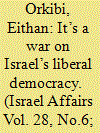| Srl | Item |
| 1 |
ID:
187564


|
|
|
|
|
| Summary/Abstract |
This article examines the discourse of the Israeli Left in the years preceding the succession of general elections in 2019–21, with a focus on claims of the purported threats to democracy presented by the right-wing government. Rhetorical analysis of opinion pieces and political commentary in the press on issues relating to education, science, and culture shows recurrent use of appeals to fear – such as comparisons with totalitarian regimes and invocation of other dystopian spectres resulting from nationalist indoctrination and processes of ‘religionization’. This article defines the appeal to fear and other forms of the Left’s identity claims making during this period as moral panic discourse, around which the Left sought to revive its relevance in the public debate at a time when it was viewed as a marginal political force in ideological decline. The article’s main argument is that while the labelling of the Right as a ‘danger to democracy’ has been entrenched in leftist discourse since the 1977 ‘Upheaval’, during the period in discussion it became the principal – almost sole – theme in leftist publicist discourse, serving as a flag issue around which the Left reorganised its identity as the ‘democratic camp’.
|
|
|
|
|
|
|
|
|
|
|
|
|
|
|
|
| 2 |
ID:
165313


|
|
|
|
|
| Summary/Abstract |
In order to move beyond the existing push/pull framework to understand disengagement, we apply a systematic coding scheme derived from Mayer and colleagues' integrative model of organizational trust to examine why people leave extremist groups. In doing so, we also rely on in-depth life history interviews with twenty former left- and right-wing extremists to examine whether antecedents of distrust vary between the two groups. Findings suggest substantial similarities and important differences between left- and right-wing extremists' decision to leave. In particular, perceptions of poor planning and organization, low-quality personnel and vindictive behavior generate perceptions of organizational distrust and disillusionment. Although findings from the current study are based on a relatively small sample, notable similarities were identified between both groups regarding sources of distrust (e.g., leaders, group members). We also identified differences regarding the role of violence in weakening solidarity and nurturing disillusionment with extremist activities. We conclude this article with suggestions for future research that extend the study of terrorism and that may have significance for how practitioners address countering violent extremism initiatives.
|
|
|
|
|
|
|
|
|
|
|
|
|
|
|
|